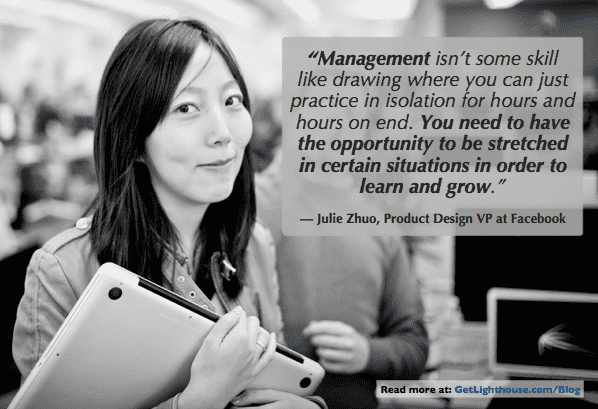"You must be interested in finding the best way, not in having your own way.” - John Wooden, 10-time NCAA Men's Basketball Champion as coach of the UCLA Bruins
Are you obsessed with how your team is performing their tasks? Are you afraid to delegate, so you review everything yourself? Do you find yourself constantly correcting their mistakes?
If the answer is yes to these questions, you are likely a micromanager.
Micromanagers are often perfectionists who want their team's work and results to be impeccable. And while there's nothing wrong with setting high standards for your team, perfectionism can be a big burden to carry and may cause issues for you and your people.
In fact, research by psychologists Emily Kleszewski and Kathleen Otto from Germany's Philipps University of Marburg has shown perfectionism is a leading cause of stress and burnout in the workplace - both for the perfectionist and the people around them.
This is why knowing when to be more hands-off and when to provide support and guidance to your team is one of the most important skills you can master.
What is the definition of a micromanager?
"Micromanagement is a pattern of manager behavior marked by excessive supervision and control of employees' work and processes, as well as limited delegation of tasks or decisions to staff.”
If you're acting like a Micromanager, you may be displaying some or all of the following behaviors:
- You are never satisfied enough with deliverables.
- They spend a lot of their time correcting other people's work and are laser-focused on every little detail, no matter how big or small a task is.
- They ask for updates on where things stand, where their team members are, and what they're doing way too often.
- They want to be cc'd on all emails and included in every meeting.
- They have difficulties delegating tasks and trusting others to do things on their own.
If you notice some of these patterns in your own behavior, you could be causing your team to feel stressed out and eroding the trust they have in you.
Today, we highlight how you can find the balance between micromanaging and a more hands-off approach to make your team feel more motivated - and save yourself from burning out as well.
Table of Contents:
- Part 1: The Negative Effects of Micromanagement (and What to Do Instead)
- Part 2: How to stop micromanaging - 3 techniques every manager can benefit from
- Conclusion

The Negative Effects of Micromanagement (and What to Do Instead)
Plenty of research has shown how corrosive micromanagement can be in various areas of your team's work. Let's go over its most damaging effects and what you can do to avoid them.
Micromanagement is bad for trust and morale
In a survey conducted by Trinity Solutions and published in author Harry Chambers' book on micromanagement, My Way or the Highway, 85 percent of participants said their morale was negatively impacted by micromanagers.
As author Muriel Maignan Wilkins explains in the table below (from his article in the Harvard Business Review), micromanagers can often say things that will make their team feel like they can't be trusted. If you find yourself thinking or saying some of these things, consider how they could be affecting the person you're talking to.
They're likely to think you don't trust them or believe in their abilities. They're also going to be afraid of making mistakes and feel discouraged from trying things on their own. Yet, it is independence, the ability to learn from one's mistakes, and bringing your own ideas and creativity that makes work satisfying for so many people.
What you think is a valid argument for micromanagement can often destroy the relationships you have with your people and cause their morale to stay low in the long term.

Micromanagement causes turnover
"People leave managers, not companies”, is a sentence we've been referencing in our Lighthouse blog posts for quite a while - and it is especially true in the context of micromanagers.
According to a study by NCBI, the effects of working for a micromanager include "low employee morale, high staff turnover, [and] reduction of productivity.” NCBI's research lists micromanagement among the top three reasons people want to change jobs.
This is especially true for your best, most experienced staff. Those that are already great at their job, and may even know better ways to do their work than you do will be particularly frustrated by being micromanaged on their job.
Ask yourself: Is doing things your way every time really worth losing some of your best and most experienced team members? If you can't afford to lose your best performers like most managers, you'll need to cut down on micromanaging.
Further reading on other reasons for turnover and what to avoid:
- 4 Potential Concerns Causing High Employee Turnover in 2021 according to Gallup and others
- Why Your Employees Leave in Waves + How to Fix Your Growing Employee Turnover Rate
- Why Reducing Nonprofit Employee Turnover Will Better Your Good Cause
- The Top Manager Mistake that Causes Turnover
Micromanagement causes burnout
A study by Collins and Collins has shown teams that are micromanaged are 3 times more likely to experience burnout.
Even worse, if you're a micromanager, you're likely to be affected by burnout, too. As your team grows, you won't be able to control everything. And as your workload increases, the quality of your work will slip because your entire team will be too dependent on you.
What that creates is a lot of frustrated, checked-out team members waiting for you to tell them what to do while knowing their work will never be good enough. It also leaves you with too much work, puts unnecessary pressure on you, and keeps making things worse as your team grows, leading to an unending cycle of frustrations and failures.
Further reading on the causes of burnout and helplessness for you:
- Avoiding Employee Burnout: How to Help You & Your Team Thrive in Quarantine
- 4 Tips on How to Deal with Anxiety at Work in the Long-Term
- The two words leaders should fear most that cause employee disengagement

Micromanagement is bad for productivity
According to a survey by staffing agency Accountemps, more than 55 percent of respondents say that micromanagement negatively impacts their productivity.
This makes sense, as any leader who constantly corrects their team's work is more of a distraction than a helper. Even the thought of them can make people look over their shoulder and prevent them from ever truly focusing.
Despite wanting their team to do great, the net impact of micromanagers is negative. In many cases, especially on medium to small impact projects, done will beat perfect.
Instead of focusing on every little detail in your team's work, think about the outcome and how you can be an enabler, rather than replace them. There is absolutely room for constructive feedback, but is your feedback about the quality and outcome of their work, or is it that you don't like the way they did something for purely stylistic or process reasons?
That's a lot for anyone to unpackage, which is why you'll need to take some time to reflect on how you're giving feedback to your team. Only in pausing and looking back at recent situations will it become clear if you're helpful or hindering your team in how you're managing (or micromanaging).
Further reading on ways to improve productivity through mindfulness:
- Why You Need to Improve Your Mindfulness at Work (and how to do it)
- Mindfulness at Work: How Mindfulness Can Make You a Better Manager

How to stop micromanaging - 3 techniques every manager can benefit from
Now that we've covered the negative effects of micromanagement, it's time to show you what you can do to overcome it and become a better leader.
1. Use Task Relevant Maturity to learn how to delegate
If you're a micromanager, you likely have difficulties delegating tasks effectively. Luckily, there's a great technique described by Andy Grove that introduces this process gradually and instills confidence in your team over time:
"How often you monitor should not be based on what you believe your subordinate can do in general, but on his experience with a specific task and his prior performance with it – his task relevant maturity…
As the subordinate's work improves over time, you should respond with a corresponding reduction in the intensity of the monitoring.”
Here's a table that can help you know what to do for any task you need to give to someone on your team based on their skill level for that task (aka- their TRM):
If someone's performing a task for the first time, you should be very hands-on with them in the beginning. At this stage, you being a micromanager will actually help them. You can expect lots of questions from them, so be prepared to support them every step of the way.
Then, as their Task Relevant Maturity grows, accept it's time to step back a little. As difficult as this may be for you, give them more and more freedom to find solutions the way they see fit.
Of course, your input as a manager will still be appreciated. Ask them how they'd manage a situation and coach them on any changes instead of telling them exactly what and how to do things - this is where you'll have to fight that micromanager urge inside you.
At this point, they'll be able to adjust their work and learn how to stand on their own with your support and guidance. This is very important for lowering your overall workload.
Finally, when they become skilled at something, praise them and allow them to work even more independently. Ask them to take the initiative. Your role now is to listen and coach if needed only. You set the standard and expectations, while they determine how to best accomplish the task.
At this point, you should be getting fewer questions from them. That's because you'll be setting very little except for the outcome, leaving them to lead projects on their own.
Task Relevant Maturity is a super important concept for any manager, especially for micromanagers. It allows you to start delegating gradually, while still providing input where needed.
For more detailed instructions on how to apply Task Relevant Maturity to become an awesome leader, check out:
- The Most Important Management Concept You're Missing: Task Relevant Maturity
- How You May be Causing Low Employee Morale by not Applying TRM

2. Use chaos to foster creativity and innovation
As a manager, you're going to have to come to terms with giving up control from time to time. That's because forcing rigid rules on your team all the time can come at a very high price. It means you're limiting people's opportunities to express themselves freely, innovate, and learn from their mistakes.
A way to introduce more flexibility into your team's everyday life is to embrace chaos. Both in nature, and in our society, chaos is a force that causes new ideas to form and structures to reorganize.
Belgian physicist Ilya Prigogine proved that chaos is the main driver behind the evolution of natural systems. When it causes a system to break down, it also causes it to evolve, freeing up its elements and making them reorganize.
Some examples of this include:
- The human brain's ability to form new neural networks after a permanent injury
- Schools of fish reorganizing in a huge close formation to deal with predators
- Black markets developing as a consequence of unpredictable economies, rising market prices, etc
And there a more than a few examples of leaders who used chaos to their advantage, including:
- Steve Jobs, who had the corridors at Apple and Pixar designed to make people from different departments run into each other every day. This led to more spontaneity and encouraged people from various backgrounds to connect in ways that led to new innovations, ideas, and collaboration.
- Legendary director Martin Scorsese would intentionally write ambiguous acting directions to get the cast of his Oscar-nominated film, "Goodfellas,” to improvise. For example, the script would instruct Joe Pesci or Robert De Niro to "tell a story.” Scorsese wanted the actors to find their own solutions and was ready to step back to get the best out of their performances.
By rejecting chaos, micromanagement stifles creativity and growth. A study by Kathleen Vohs, PhD, of the University of Minnesota Carlson School of Management, has shown that creative thinking can often be correlated with chaotic or messy environments.
Now, embracing chaos doesn't mean giving up on rules completely. It means being willing to accept failure as a way for your team to grow. It also means accepting there are always new approaches to problems that may differ from your own.
Knowing how and when to introduce chaos into your team's work is difficult and often depends on the context, so we've put together this guide on how you can do it successfully:

3. Learn how to become a coach to your team
"Never tell people how to do things. Tell them what to do, and they will surprise you with their ingenuity.” - General George S. Patton, U.S. Army
Today's managers must be capable of fulfilling many roles. The role of being a coach for your team is one of the most important ones.
Coaching offers a healthier, non-judgemental alternative to micromanaging. As the image below from Gallup suggests, coaches are prepared to ask questions to understand the context, and avoid bossing people around.
They also approach feedback differently - instead of sayingm "WRONG WRONG WRONG! DO IT MY WAY!" they're more likely to say something like, "Hey - this looks off or doesn't work because of X. Here's what I'd do instead and why..."
Unlike micromanagers, great coaches also understand the value of that famous old adage:
"Give a man a fish, and he'll eat for a day. Teach a man to fish, and he'll eat for a lifetime.".
They understand the impact of giving people autonomy and why it's one of the key ways to motivate them to do creative, knowledge work.
Here's a great TED Talk on the importance of autonomy for especially employees with creative responsibilities by Dan Pink:
Finally, another huge difference in how coaches think compared to micromanagers can be seen in the timing of the feedback they give. Micromanagers are so obsessed with correcting their team's work, their feedback often comes too late. This leaves the team member unable to learn from their mistakes.
Unlike them, coaches provide regular feedback in their 1:1 meetings. For them, progress is an ongoing effort, not a one-off event. This gives them plenty of opportunities to help their team course-correct and learn gradually.
We've written in-depth posts on how how you can become a better coach to your team and why it matters, so you can master this essential skill:
- Why Today's Managers must Become Coaches (and how you can do it)
- 12 Questions to Ask Your Team to Become a Better Coach at Work
- Employee Coaching: Why it Matters and How to Become Great at It

Unlearn micromanagement to become a more complete leader
According to author Stephen M.R. Covey, "great cultures move at the speed of trust through less micromanaging and more ownership.”
If you know you've been a micromanager, now is the time to change. In order to do that, follow our three strategies and get more out of your own and your team's time:
- Use the concept of task relevant maturity to successfully delegate tasks and know when to be hands on vs. hands off
- Introduce a bit of chaos into your work for more creativity and innovation from you and your team
- Coach your team rather than boss them around
Micromanagement is a bad habit that can be replaced over time with the right skills and structure.

What are the signs of a micromanager?
A micromanager is someone who is too controlling of their team. They stifle their team's creativity, and leave them bored and frustrated.
The signs of a micromanager to look for are:
- They dictate every little detail to their team
- A desire to control and monitor every step of everyone's work
- Asking for updates on where things stand, where their team members are, and what they're doing way too often.
- Wanting to be cc'd on all emails and included in every meeting.
- Having difficulties delegating tasks and trusting others to do things on their own.
How do you deal with a micromanager?
If you have a micromanager, the best thing you can do is communicate with them your frustrations, and suggest a better way forward.
Work with them to set desired outcomes and ask for more freedom to determine how you get there. As long as the outcome is met, they should be willing to give more independence to you over time, leading to them micromanaging you less.
Why is micromanaging bad?
Micromanaging is bad for a number of reasons:
- It damages the trust and morale of your team
- It is a leading cause of turnover
- It hurts productivity as everything is slowed by the need for manager decisions, monitoring and approval




